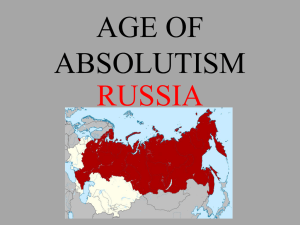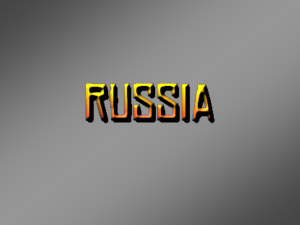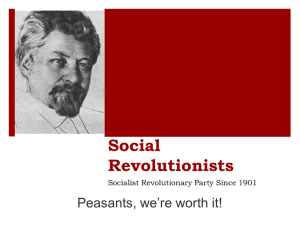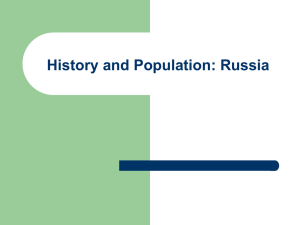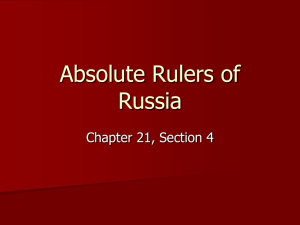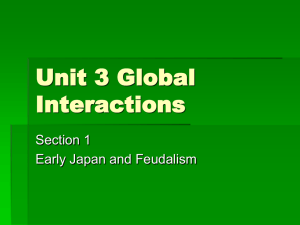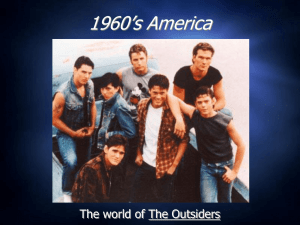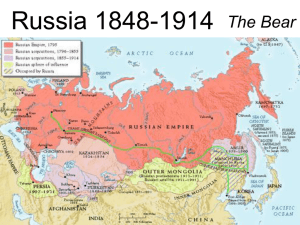Russian pre-history
advertisement
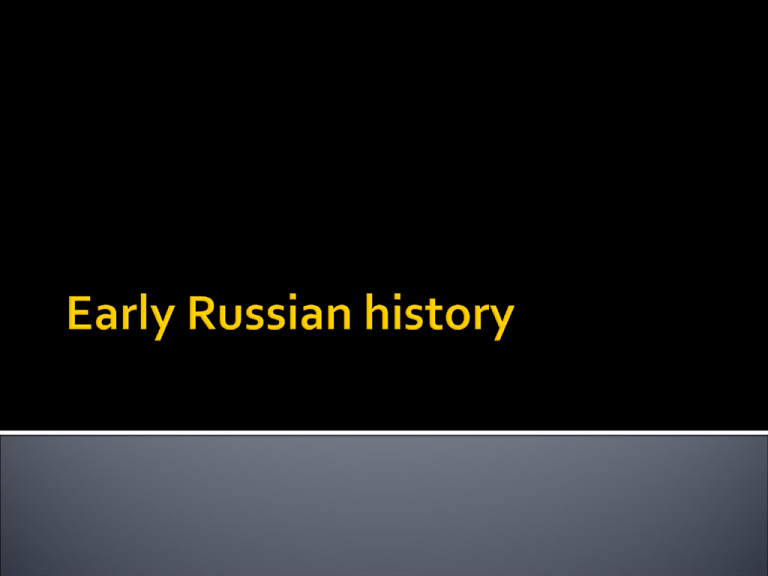
Land of the Rus St. Petersburg (est. 1703) . B.C. – Early Slavic peoples occupied area from St. Petersburg to Kiev http://youtu.be/9r_WXKto268 Russia Land of the Czars 1 – 10 mis. 9th. Century – Vikings conquered Novgorod and Kiev, creating State of Rus 11th. Century – Heavy trade with Constantinople (Istanbul); Byzantine culture and Christianity introduced 12th. Century – Moscow established, capital of Moscovy principality City assemblies – the veche – were the primary bodies of government. Princes were not all-powerful Decisions were made democratically by heads of families http://youtu.be/haXaD6kuPSU Russia Land of the Czars 2 – 10 mis. 13th. Century – Mongols overrun Rus Animated map of the Mongol Empire 14th. Century – Kahn appoints Prince Ivan I of Moscovy (Moscow) Grandprince, to dominate and collect tribute from other areas 14th. Century – Prince Ivan II builds army against Mongols Son, Dmitry I, enjoys victories Mongols splinter info factions 15th. Century – Prince Ivan III defeats last of the Mongols By then the Rus – Russia – has split into three parts: ▪ Southeast – Pagan Lithuanians, eventually captured by Poland ▪ Northwest – Novgorod. Politically Kievan until overrun by Moscow ▪ Northeast – Dominated by Moscovy (Moscow) http://youtu.be/R_MLYEQEkFI Russia Land of the Czars 3 – 10 mis. Ivan III takes on the unofficial title of Czar – meaning Caesar Moscow becomes capital of Holy Russian Empire Moscow rebuilt, splendid churches and palaces Greater control exercised over serfs – limits placed on leaving for a new noble 16th. Century – struggle in the Kremlin for supremacy 1547, Ivan III’s grandson, Ivan IV crowned as Czar, a new official title Gains total power: conquers principalities, confiscates properties of nobles Moscovy expands, wages war, becomes an empire by conquest Ivan IV feels he is being betrayed, turns on top advisors, imprisons, tortures and kills them. His reign of terror earns him the name “Ivan the Terrible.” Reign of terror costs many lives, weakens Russians, enables Mongols to sack Moscow 16th. http://youtu.be/9ggZzZWVXzw Late Century – Russia loses Northern Russia Land of the Czars 6 – 10 mis. territories and access to Baltics in war with Sweden Famines, disease, widespread unrest; Moscovy in political/economic ruin Crown passes from one man to another, all are killed or deposed 17th. Century – In 1610 Sweden and Poland invade. Poles capture Moscow. Two years later a Russian militia of nobles and peasants retakes the city In 1613 Mikhail Romanov, 16, a distant relative of Ivan IV, is selected as the new Czar Romanov family became a successful dynasty that lasts three centuries Serfdom becomes part of social structure Lesser nobility – the “gentry” – fought the wars. It needs cheap labor Laws passed that bind peasants to their “masters” creates a class of slaves Russia begins trading with the West, expands through conquest to the Pacific After succession of rulers, Peter I (Peter the Great) becomes Czar Self-image as a reformer, not a religious figure Looks to West, not East. Introduces Western culture Wants commerce with the West and its technology But Russia virtually landlocked To the North: Sweden and Poland block the Baltic To the South: Ottoman Empire (Turks) holds the warm waters of the Black Sea Forms armies, large-scale shipbuilding, creates Navy Captures outlets to the Black seas, then the Baltic Builds a new capital – St. Petersburg (1711) Asserts self over Orthodox Church, becomes Emperor Dies without naming an heir http://youtu.be/Zfhe4BTp2-g http://youtu.be/0k0O-zsJgrc http://youtu.be/nD_I2nBB5RE Russia Land of the Czars 7- 9 – 30 mis. Climate, agriculture and rural culture Repression and use of force against the peasantry Creation of a class of serfs Expansionism, securing access to Baltic and Black seas Militarism Feelings of backwardness Drive to advance culturally & economically Czars’ paranoia and use of terror against top aides Subjugation of Orthodox Church Consider how these and other factors, and their interplay, might have affected the sociopolitical climate and set the stage for the 1917 Russian Revolution that overthrew the Monarchy and installed a Communist regime As the term progresses, compare and contrast the behavior of the Czars with that of Communist leaders Throne wound up with an infant 1741 – Elizabeth, Peter’s daughter, takes over in a coup Brings over German prince as heir-presumptive (Peter III) Brings over his second cousin, Sofia, 15, to be his wife Elizabeth dies in 1761; replaced by Peter III, pro-Prussian http://youtu.be/Y7l08ARss4s One year later Sofia, renamed Catherine, seizes power http://youtu.be/MSycdFcog5s Expands territory all the way to Alaska Russia Land of the Czars 11, 12 – 20 mis. Golden Age – art, culture, science Reform – rule based on law, strengthen local governments, expand education Champions Age of Enlightenment, where reason rules Greatly welcomed by the elite, who saw her as one of them But “unity of culture” broken; gap between wealthy/educated and the peasantry Russia depends on slave labor – conflicts with newfangled notions of human rights Catherine depends on nobility – the landowners, the aristocrats – to support her military adventures, does not free the slaves http://youtu.be/8KVnYjamJmY In the provinces the serfs grow restless Russia Land of the Czars 13 – 10 mis. Demand end to taxation, military conscription Want to divide up land among themselves Catherine forcibly puts down a major serf revolt Russian expansion continues. Catherine captures Black Sea coast from the Ottoman Empire (Turks), takes whole of Crimea in 1784 Rule eventually stretches from Poland to Alaska French Revolution of 1789 stirs up Europe; 1793, Louis XVI executed Catherine realized the Enlightenment may be more than what she bargained for. 1796 – Catherine dies, son Paul I takes over. Is erratic and paranoid. 1801 Paul I is assassinated. His son Alexander I takes over over. 1812 war with Bonaparte of France. Moscow burns, French retreat. 1814 Russia and European allies vanquish Bonaparte, enter Paris. http://youtu.be/Izw29EJvv-g 1825 – Alexander I dies, brother Nicholas takes over Russia Land of the Czars 15 – 10 mis. Insists on an absolute monarchy. Immediate revolt by military officers, “Decembrists,” who demand a Constitutional Monarchy Nicholas I forcibly puts down the revolt, uses secret police to quell dissent Russian elite embarrassed by material and political backwardness. Russia left out of industrial revolution 1853 – Crimean War - Russia attacks Ottoman Empire to control the Balkans and Turkey England and France side with the Turks Modern tactics and technology –steamship, railroad, advanced arms – defeat the Russians 1855 – Nicholas I dies. His son, Alexander II takes over. http://youtu.be/8PFQ7Th_rAs Russia Land of the Czars 17 – 10 mis. A realist, he concedes defeat in Crimea Sets out to modernize Russian society, its economy and Army Creates Constitutional assembly, makes plans to share power through a Parliament, Encourages trade, private property, commerce 1861 – goes against the mobility to emancipate the serfs Reforms legal codes (Act of 1864) Separation of powers Public trials Trial by jury Presentation of evidence Defense counsel Juries for nonpolitical offenses Cont’d Despite Alexander II’s reforms, the economy keeps deteriorating Serfs go into debt to buy land “The People’s Will” Agricultural production plummets Poverty worsens Conditions strengthen the hand of the Czar’s opponents More permissive security climate works to the regime’s disadvantage 1881 – “People’s Will”, a cell of educated terrorists, murders Alexander II in a suicide bombing Alexander’s son, Alexander III promptly hangs perpetrators, dials back reforms abolishes plan for legislature, institutes repressions, relocates Jews to Pale of Settlement 1887 – Discovery of plot against Alexander III leads to more hangings. One of the executed is the brother of a youth who would later be known as Lenin.
